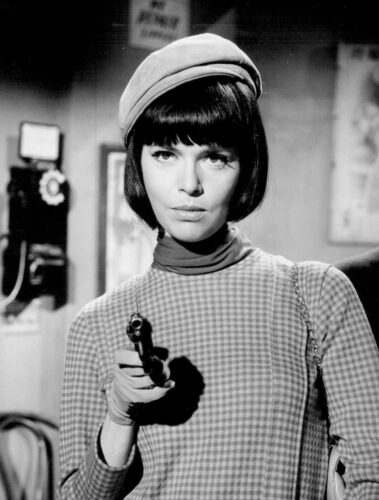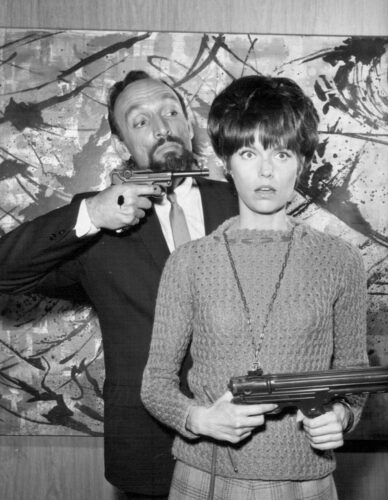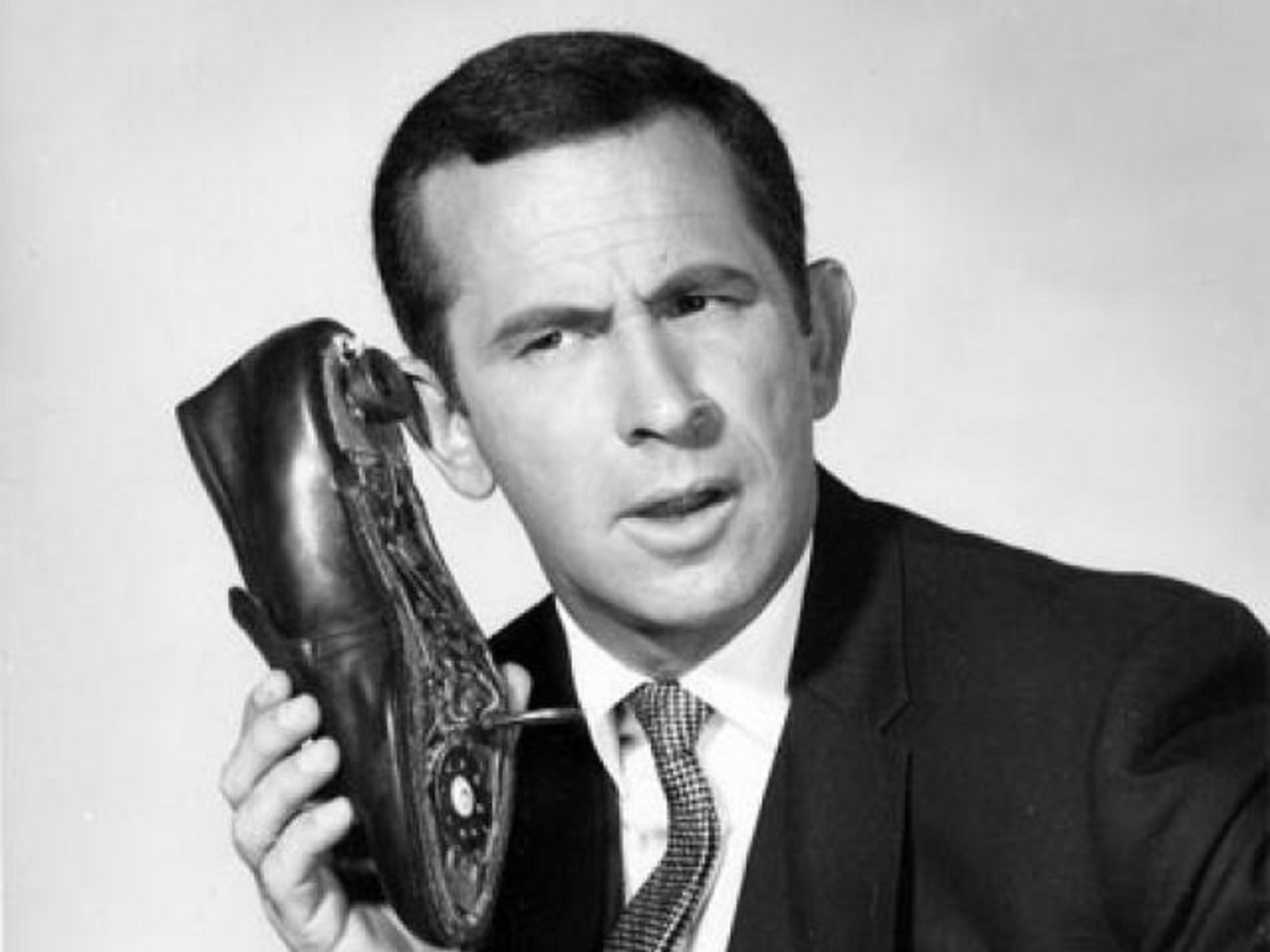In the fall of 1965, American television audiences were introduced to a new kind of secret agent, one who was more likely to trip over his own gadgets than save the world. His name was Maxwell Smart, Agent 86 of CONTROL, and he was the star of Get Smart, a satirical sitcom that would go on to become one of the most influential and beloved comedies of its era. Now, in 2025, we celebrate the 60th anniversary of this groundbreaking series that turned espionage into entertainment and left an indelible mark on pop culture.
The Origins of a Comic Masterpiece
Get Smart was born out of a unique collaboration between two comedic geniuses: Mel Brooks, known for his irreverent humor and future classics like Blazing Saddles and Young Frankenstein, and Buck Henry, a sharp-witted writer who would later co-create Saturday Night Live. Tasked with spoofing the spy genre, then at its peak thanks to James Bond films and shows like The Man from U.N.C.L.E., Brooks and Henry crafted a show that was equal parts parody, slapstick, and satire.
Premiering on September 18, 1965, on NBC, Get Smart was an instant hit. It starred Don Adams as Maxwell Smart, a secret agent whose confidence far exceeded his competence. His partner, Agent 99, played by Barbara Feldon, was everything Smart was not: intelligent, graceful, and effective. Together, they battled the nefarious forces of KAOS, a fictional international organization bent on world domination.
A Sitcom That Broke the Mold
What made Get Smart stand out in the crowded landscape of 1960s television was its fearless embrace of absurdity. The show was packed with outlandish gadgets, such as Smart’s shoe phone and the infamous Cone of Silence, a device designed for secrecy that never worked. These inventions poked fun at the high-tech wizardry of spy films, turning sleek espionage into comic chaos.
The writing was razor-sharp, filled with clever wordplay, running gags, and satirical jabs at bureaucracy, politics, and the culture of surveillance. Don Adams’ delivery of catchphrases like “Would you believe…?”, “Missed it by that much,” and “Sorry about that, Chief” became iconic, cementing the show’s place in the comedic canon.
Critical Acclaim and Cultural Impact
Over its five-season run, Get Smart aired 138 episodes, moving from NBC to CBS in its final year. It won seven Emmy Awards, including three for Don Adams as Outstanding Lead Actor in a Comedy Series, and was nominated for many more. The show’s success was more thant commercial, it was cultural. It helped redefine what a sitcom could be, blending genre parody with character-driven humor.
Barbara Feldon’s Agent 99 was particularly groundbreaking. In an era when female characters were often relegated to secondary roles, 99 was portrayed as Smart’s equal, often his superior. Feldon’s performance was cool, confident, and charismatic, offering a rare example of a strong, capable woman in a lead comedic role.

Beyond the Original Series
The legacy of Get Smart didn’t end with its original run. In 1980, Don Adams reprised his role in the feature film The Nude Bomb, which attempted to revive the franchise for a new generation. Though the film received mixed reviews, it demonstrated the enduring appeal of the character.
A more successful revival came in 1995, when Adams returned for a short-lived TV reboot, joined by Barbara Feldon and introducing Andy Dick as their son, Agent 66. Then, in 2008, a big-budget Hollywood adaptation starring Steve Carell as Maxwell Smart and Anne Hathaway as Agent 99 brought the franchise back into the spotlight. While the tone shifted toward action-comedy, the film paid homage to the original’s spirit and introduced Smart to a new generation.
Satire with Substance
One of the most remarkable aspects of Get Smart was its ability to balance silliness with substance. Beneath the slapstick and one-liners was a sharp critique of Cold War paranoia, government inefficiency, and the absurdities of modern life. Mel Brooks once said, “We weren’t just making fun of spies, we were making fun of everything.” That ethos gave the show a timeless quality, allowing it to resonate across decades.
The show’s satire extended to its portrayal of CONTROL and KAOS, which were less about good vs. evil and more about the futility of bureaucracy. CONTROL agents often spent more time navigating red tape than fighting villains, while KAOS operatives were just as prone to incompetence as their counterparts. It was a world where no one was truly in control, a theme that still feels relevant today.

Technological Humor Ahead of Its Time
Get Smart was also ahead of its time in its use of technology as a comedic device. The gadgets, while ridiculous, anticipated a future where communication and surveillance would be omnipresent. Smart’s shoe phone, for example, was a precursor to mobile phones, and the show’s obsession with listening devices and hidden cameras foreshadowed the digital age.
The humor wasn’t just in the gadgets themselves, but in their failure. The Cone of Silence, meant to ensure privacy, always malfunctioned, an ironic commentary on the illusion of security. These jokes weren’t just funny; they were insightful, highlighting the gap between technological promise and practical reality.
A Cast of Comedic Legends
Beyond Adams and Feldon, Get Smart featured a stellar supporting cast. Edward Platt played the long-suffering Chief of CONTROL, whose exasperation with Smart was a constant source of laughs. Guest stars included a who’s who of 1960s television, and recurring characters like Larabee and Agent 13 added depth to the CONTROL universe.
Don Adams’ performance was central to the show’s success. His clipped delivery, inspired by his earlier stand-up routines, gave Smart a unique rhythm that made even the most absurd lines land perfectly. Adams was so closely identified with the role that he later voiced a similar character, Inspector Gadget, in the 1980s animated series.
Final Thoughts
In an age of reboots, streaming, and endless content, Get Smart stands out as a masterclass in comedic storytelling. Its influence can be seen in shows like Archer, Brooklyn Nine-Nine, and even The Office, where absurdity and satire walk hand in hand.
More importantly, Get Smart reminds us that comedy can be both entertaining and enlightening. It can challenge norms, poke fun at power, and offer a mirror to society. all while making us laugh. That’s a legacy worth celebrating.
